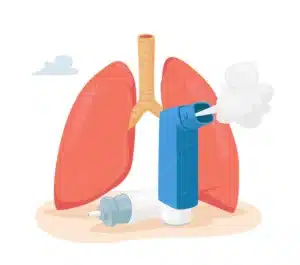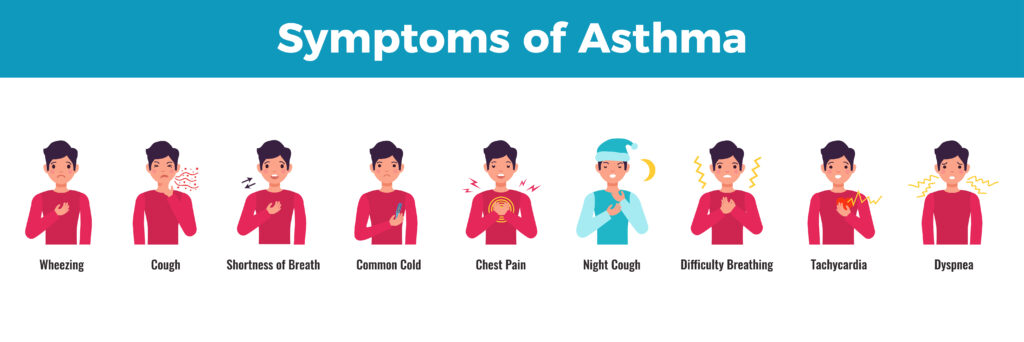- #1 Homeopathy Doctor in Pune, India
Homeopathy Treatment for Asthma
Asthma is an inflammatory disease in the airways that are connected to the lungs. It causes difficulty in breathing due to the overproduction of mucus in the airways resulting in more coughing.
Swollen airways and inflammation cause mucus to build, which makes a whistling sound while breathing accompanied by shortness of breath. Although asthma can not be cured permanently, its symptoms can be managed with proper medications.
BEST HOMEOPATH DOCTOR
Awarded By Asian News
40,123+
Happy Patients


What Are the Types of Asthma?
Types and causes of asthma are dependent on the symptoms produced by asthma in different ways and situations. There is a broad categorization of asthma that includes:
- Intermittent: This type of asthma is not consistent and symptoms can come and go with long normal duration in between the two asthma attacks.
- Persistent: This is the consistent type of asthma with symptoms permanently showing up. These symptoms can vary from mild, to moderate, or severe. Its severity is based on how frequently one is having symptoms and the severity of symptoms. How a person suffering from asthma feels during the attacks determines the severity of asthma as well.
Causes of Asthma
Asthma is found to have multiple causes in a person. Children are more prone to having asthma attacks as their airways are still under development. Asthma does not show its symptoms until adulthood. Of the several causes of asthma, some of the most commonly found causes of asthma are:
Genes are likely to transfer asthma from parents to a child. If a person has a family history related to asthma there is an increased risk of getting asthma for that person as well.
Children who have a history of falling sick with coughing or bronchitis or other diseases such as respiratory syncytial virus infection (RSV) are at a higher risk of developing asthma as they grow up to be an adult.
This theory states that babies after birth need to be exposed to some viruses and bacteria, for them to grow a strong immune system. Those babies who do not have exposure to any such thing as coughing or sneezing or cold, their immune systems are said not to be strong enough to fight off asthma and other allergic conditions.
Apart from all of these, other factors trigger the asthma attack in adults such as:
- Allergic: people who are allergic to different types of inhalation. They can be allergic to moulds, pollens, and pet hair. These fine particles get into the airways and irritate the airways triggering mucus formation and difficulty in breathing. Dust and smoke can also cause asthma attacks in a person allergic to such things.
- Non-allergic: Various other factors can act as triggers for asthma. Heavy work and hard activities such as exercising vigorously, stress, illness, and even weather may cause a person suffering from asthma to have an attack. Weather is known to be a highly triggering factor for some people with asthma.
- Certain medicines: some people’s bodies may be reactant to medicines such as aspirin and nonsteroidal anti-inflammatory drugs. These medicines have been found to trigger asthma in many cases.

Symptoms Involved in Asthma
Some symptoms may vary from person to person. Asthma signs and symptoms may include
- There can be shortness of breath for a person suffering from asthma which is the most common symptom of asthma among patients.
- A patient may feel some tightness or pain in the chest area.
- The patient may make a rattling sound when exhaling, which is a common sign of asthma in children.
- Due to difficulty in breathing, coughing, or rattling in the chest, there may be trouble sleeping
- Coughing or rattling that gets worse by a respiratory virus, such as a cold or the flu
There are other symptoms that a person suffering from asthma is likely to have. Such symptoms are:
- Coughing that surfaces mostly at night or when a patient is laughing or can have during exercising
- A patient with asthma experiences difficulty in talking as well.
- The person with asthma is seen to be in an anxious or panic state.
- There is fatigue involved in the person suffering from asthma.
- As breathing is difficult, the patient is seen to be rapidly breathing.
- Asthma can cause frequent infections like flu and cold.
More than a combination of the above-mentioned symptoms are said to be symptoms of asthma in a person.
Homeopathic Invention
As per latest research in homeopathy asthmatic condition can be caused by a fear or fright situations. With growing competitions in every field in modern world – man is bound to feel pressure , insecurity about job , relationships , etc For example , a fear for one’s personal safety as well as the safety of the family or closed ones can all give rise to fear conflicts. Conflicts can arise from a variety of situations, including physical abuse, domestic violence, bullying, mobbing, flooding, fire, or disaster, severe medical condition, terrible diagnosis or prognosis, frightful medical procedures, or even hospitalization
Can Homeopathy Treat Asthma?
Yes. Homeopathy is found to have reduced the symptoms involving asthma and provide relief to the person in the worst of asthma attacks. The hypersensitivity of an asthmatic’s immune system can be changed by homoeopathic treatment. A person won’t react negatively to allergens the way he did before after the immune system hypersensitivity improves during treatment. Only a thorough constitutional homoeopathic treatment for asthma may do this. Also homoeopathic medications reduces dependency on other medications
Homeopathic medicines that are found to have relieved asthmatic conditions are:
This is given to the patient who feels exhausted, but still feels very restless and anxious. There can be breathing-related problems that tend to be worse when the patient is lying down or sleeping at midnight. The patient feels better when tries to sit up. There is the sound of dry rattling which may lead to coughing that could bring up frothy whitish fluid.
Rattling sound may start when a person’s body gets too warm. There may be some rattling sounds while eating fatty food as well. In such cases, coughing can involve yellow-coloured mucus that can cause gagging and choke the person. The patient may feel some kind of tightness in the chest that gets worse in the evening and at night and is relieved by cool fresh air.
It is given to a person who has a hard cough during an asthma attack. The respiratory tract becomes very dry and breathing gets tougher. There is the production of mucus as well.
It is given to the person suffering feels weak along with a hollow sensation in the chest and coughing leads to gagging. The person may even have cold hands and feet but feel the need to be in the open air.
This medicine provides relief to tense, constricted feelings in the chest which a patient gets during asthma attacks, with pressure in the stomach.
* Note – Above medicines are for knowledge purpose only. Take the medication only after doctor’s consultation. Do not self medicate
Our Patient Testimonials
Dr. Tathed's Homeopathy Autism Case Study
When a 40-year-old male walked into our clinic, he carried a lifelong burden of asthma, characterized by a distressing cycle of breathlessness. His struggle was not just with asthma but with its triggers that came with every weather change – beginning with a runny nose, escalating to a dry cough, and culminating in severe breathlessness. His nights were particularly challenging, and cold beverages only worsened his condition. Despite numerous courses of antibiotics, relief was fleeting, lasting merely for the duration of the medication.
Physical and Family Health Overview
A glimpse into his physical generalities revealed a normal appetite with an intolerance to hunger, significant perspiration especially around the scalp and neck, and a sweet tooth that unfortunately aggravated his symptoms. He was a lover of cooler climes and open spaces but was intolerant to hot weather. A family history showed a mother with migraines and a father who had passed away due to diabetic complications.
Emotional Well-being and Treatment Response
On the mental and emotional spectrum, he was an introvert with a sensitive disposition, often overwhelmed with concern for his family’s future. After a thorough evaluation of his physical symptoms, family history, and mental generals, a tailored homeopathic treatment plan was initiated.
The journey to recovery unfolded positively across several follow-ups:
First Follow-Up: A noticeable improvement in vitality, with a significant reduction in cough, coryza, and breathlessness. The patient reported feeling 70% better overall.
Second Follow-Up: A marked improvement in breathlessness, now 80-90% better. Throat pain was also substantially alleviated, and mornings began on a fresher note.
Third Follow-Up: Despite a mild return of coryza and sneezing, there was no difficulty in breathing. Appetite and sleep quality remained good.
Fourth Follow-Up: A transformation was evident. The patient expressed feeling significantly better, with normal breathing and a drastic reduction in cold and coryza occurrences.
This case is a testament to the holistic healing that homeopathy offers, emphasizing not just the physical ailments but the intricate connection between body, mind, and emotional health. Our patient’s journey from chronic asthma to breathing with ease is a story of resilience and the gentle efficacy of homeopathic medicine.
A 26-year-old male presented with a 4 to 5-year history of nasal blockage, shifting from one nostril to the other, intensifying during bedtime. The blockage was accompanied by feelings of dullness, inactivity, and irritability, with the presence of thick, whitish mucus worsening in the morning and at night. His medical history included two operations for pneumothorax, and he experienced episodes of sharp chest pain, profuse sweating, and elevated blood pressure.
Unusual Cravings and Personality Insights
The patient had peculiar cravings for wet soil and chalk and preferred cooler environments. He was talkative yet reserved, displaying anger only towards those he perceived as inferior. His fears included examinations and sea water, and he had a tendency to avoid critical people, indicative of his mild and introverted nature.
Progressive Treatment and Follow-ups
Treatment commenced with a focus on his unique symptoms and personality traits, leading to a series of follow-ups:
First Follow-Up: He reported a 30 to 40% improvement, with reduced nasal blockage and mucus production. His appetite was good, and sleep was refreshing.
Second Follow-Up: The patient experienced a fever, vomiting, and significant weakness, with a decreased appetite and a bitter taste in his mouth.
Third Follow-Up: There was a marked improvement in nasal congestion. Despite a hectic work schedule due to night shifts, the patient’s energy levels remained high, and he was able to handle work confidently without feeling burdened.
Fourth Follow-Up: Continued improvement was noted in nasal obstruction and cough. The patient observed an increase in thinking power and concentration, though his stools were unsatisfactory.
Fifth Follow-Up: Improvements were consistent across nasal obstruction, stool quality, and appetite.
Sixth Follow-Up: The patient felt better overall, with some coryza and greenish expectoration present, and slight nasal congestion.
Seventh Follow-Up: He experienced a 90% improvement in nasal obstruction, better cough symptoms, and was managing increased work pressure despite a disturbed routine.
This case demonstrates the effectiveness of a personalized treatment approach in managing chronic nasal blockage and associated symptoms, leading to significant improvements in the patient’s physical and mental well-being, alongside the ability to cope with demanding work conditions.
A 13-year-old boy’s journey with asthma began in his early childhood, amid the bustling environment of Delhi. Diagnosed with asthma at the tender age of five, his young life has been punctuated by the search for effective management of his condition. Despite multiple consultations with various physicians, satisfaction in his treatment remained elusive. His history was further complicated by an episode of pneumonia during his early years in Delhi.
Challenges and Triggers
His asthma was particularly sensitive, with triggers ranging from physical activities like walking, talking, laughing, and cycling, to environmental changes like a shift in weather. The temporary relief from a nebulizer was a frequent necessity during his asthma attacks.
Physical and Emotional Resilience
Physically, his appetite was robust, yet he was unable to bear hunger well. His perspiration was notable for its odor, but his sleep and bowel movements were unremarkable in their regularity. His intolerance to cold weather was a significant concern. Developmentally, he had met his milestones on time, with vaccinations administered as scheduled.
Mentally, he presented as an extroverted and jovial child, comfortably engaging with strangers and thriving in social settings. Despite his fears of dogs, hospitals, and horror films, his spirit remained undiminished. Academically average, he excelled in sports, showcasing a balanced profile of interests and abilities.
Treatment and Remarkable Improvement
After a comprehensive review of his history and personality, a homeopathic regimen was tailored to his unique profile. Progress was tangible and heartening:
First Follow-Up: A 50% improvement was noted. He managed to stay off the pump and other medications, indicating a substantial enhancement in his condition.
Second Follow-Up: His condition continued to improve with medication, although indulgence in ice cream led to a mild resurgence of coryza.
Third Follow-Up: His reliance on the pump reduced significantly, with only two instances of use in three weeks. Breathlessness also showed marked improvement.
Fourth Follow-Up: A complete turnaround was observed. The boy now engages in outdoor sports and cycling with ease, reflecting a significant improvement in his asthma management.
This young individual’s case highlights the potential for homeopathy to bring about significant relief in asthma symptoms, allowing for a return to normalcy and the joys of childhood activities.
At just 4 years old, a young girl faced daunting health challenges, presenting with fever, dry cough, and wheezing—symptoms that intensified in the morning, at night, while lying straight during sleep, and with weather changes. Relief was found in warm drinks. Her condition was traced back to an incident two years prior when a seaside trip resulted in fever and cough, initially managed with allopathic medication. However, a severe recurrence led to a diagnosis of necrotizing pneumonia, confirmed by CT thorax showing significant complications.
Post thoracotomy, her once socially active and fearless nature was overshadowed by new fears, irritability, and a reluctance to engage with new people or the opposite sex. Her inquisitive and emotional personality remained, but her impatience grew.
Dietary Preferences and Physical Attributes
Despite her health issues, her appetite for sweets, chicken, and cold drinks remained, as did her preference for milk and her dislike for tight clothing. She was noted to have scanty perspiration and an aversion to heat.
Progress Through Homeopathic Care
The homeopathic treatment focused on her comprehensive history, and her responses to medications were carefully noted:
First Follow-Up: Improvement in appetite and thirst was noted, though a cold, running nose, and mild fever had set in, coinciding with the start of schooling.
Second Follow-Up: She experienced a fever and nasal obstruction but showed signs of reduced symptoms and maintained normal activities.
Third Follow-Up: Fever persisted with nasal congestion and dry cough, yet her appetite and activity levels were good.
Fourth Follow-Up: A new complaint of mild abdominal pain emerged, but coughing improved significantly.
Fifth Follow-Up: There was a notable overall improvement with only mild coughing, normal activity, good appetite, refreshing sleep, and normal bowel movements.
This case highlights the young patient’s journey through severe respiratory illness, surgical intervention, and the gradual return to health with the support of individualized homeopathic treatment, showcasing a remarkable capacity for recovery in the face of adversity.
Conclusion
Homeopathy medicine is administered to persons suffering from asthma and its symptoms. However, the above-mentioned medicines are for knowledge purposes only and they are strictly forbidden to take without prior consultation with a homeopathic doctor.